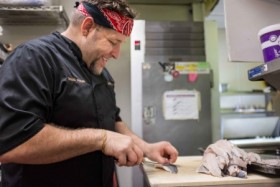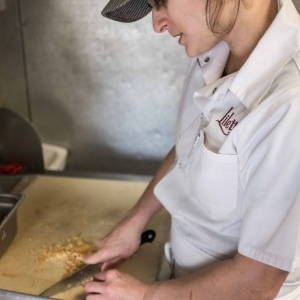
Chef Joe at home in his kitchen. Photo by Anne Heinrichs
Chef Joe of Cafe Reconcile has been in the kitchen since early morning preparing eighteen tins of bread pudding for a weekend function. His hands move with purpose as he slices French bread in haste, eager to move onto his next task. Gospel music fills the building while members of the burnt down church behind Café Reconcile set up for Sunday service. It is hard to hear anything but the knife hitting the cutting board, but Joe seems unfazed–comfortable in his own steel fortress of a kitchen.
Joe uses his kitchen to empower the students that attend Café Reconcile. Café Reconcile, much like their lead culinary instructor, is no ordinary restaurant. They aim to “transform the lives of young adults (ages 16-22) and the community through the ministry of reconciliation. [They] do this by: encouraging personal growth, providing workforce development and training, promoting entrepreneurship, working with businesses, nonprofits, and people of faith to support this transformation, and building strong communities through community economic development.” Café Reconcile has become a key community partner of Central City and the historical Oretha Castle Haley Blvd. by supporting kids from the beginning and urging them to cultivate potential careers.
“Cooking is not just a job, it is an art form that you can do as a job.”
Chef Joe, like many of his students, experienced many trials and tribulations while navigating life in his early years. At 15, he began washing dishes and working in kitchens out of necessity for a job, but as he grew older the knowledge he acquired fueled his passion for cooking. Eventually, Joe began to work in different kitchens, but he fell into the partying that awaits workers who close up shops at the end of the night. After succumbing to this lifestyle and going through his own journey of addiction, at 35, he decided to seek rehabilitation. It was at this time that Joe made the decision to never return to the kitchen- “but God had a bigger plan,” he says.
In an effort to avoid kitchens, Joe pursued a job in the Maintenance Department at Loyola University. To his dismay he broke his wrist shortly before starting his new job. A broken anything was not going to work for that field, so Loyola had to look for alternative candidates. With no other prospects, administration at the rehabilitation center urged him to take a temporary position at Café Reconcile. Joe was hesitant and skeptical, but it was work nonetheless.
After 2 weeks of prepping the dishwasher and working as a line cook, he was hooked. The environment was like nothing he had ever experienced. The staff was committed not only to the food but also to the people they were trying to impact. Food once again had a bigger purpose and he recognized the spiritual aspects of their work. He laughed as if he was exchanging a joke with God because “God knew [he] was stubborn but didn’t stop till [he] was back in the kitchen,” Chef Joe says.
At the end of his two weeks, he already began to feel the loss of Café Reconcile. He sat in his chair as his supervisor thanked him for his time, but Joe wanted to stay and wanted to be needed. His supervisor eventually finished thanking him and proceeded to offer him a job. That is when Joe knew he wasn’t done with cooking.
“Even with passion there are things one needs to learn in order to transform yourself from being a good cook to being a chef.”
Although he may be the instructor at Café Reconcile, on Wednesdays, Joe puts on his student hat while pursuing an Associates Degree in culinary arts. Joe wants to learn all sides of running a restaurant because for him what separates a cook from a Chef is their ability to manage the business side of the kitchen. Although cooking soul food requires a certain amount of passion culinary arts mobilizes both parts of the brain, creative and analytical.
The development of the culinary sector within New Orleans has caused a push for more experienced and business savvy Chefs. Joe is supportive of the increase in education programs focused on culinary arts but he is hesitant to support with conviction. The lines in his face signal his worry that it will set a standard too polarizing for those who may not succeed as well academically as they do in the kitchen. That being said, there is promise in having more education programs will push the stereotype of restaurant work being a blue-collar job. “So much stuff goes on in the kitchen other than preparing a meal. When you talk about food and the different ingredients it just does something to connect people and bring people together. This type of art is an experience and being a waiter, chef, and a hostess all contributes to that experience”(Smith, Joe. “Cafe Reconcile.” Personal Interview. 7 Nov. 2015).
“It isn’t about just helping people get a job. We want them to make a career.”
It is not just about helping these students get a temporary job or teaching them how to cook. Instead, the Café Reconcile staff aims to challenge their belief system “because the belief dictates the attitude, the attitude dictates the behavior, and the behavior is what helps someone keep their job,” Joe says. They want them to find a career. Even if culinary isn’t their forte there are so many roles within hospitality and skills that transfer over to other sectors that the Café Reconcile team doesn’t limit them.

One of Joe’s students learning to master the knife. Photo by Anne Heinrichs
According to The New Orleans Menu there is an astounding one thousand four-hundred and sixteen restaurants within the New Orleans community, and these restaurants employ an estimated fourteen thousand two-hundred and sixty-five New Orleans residents, which is fifty-one percent of the total cultural sector (All 1416 Open Restaurants, Alphabetically. (n.d.). Retrieved December 3, 2015, from http://nomenu.com/?page_id=39897;Landrieu, Mitchell. 2014 New Orleans Cultural Economy Snapshot. 2014. 11. Print). Despite the economic presence of the restaurant industry the average salary of a Chef in New Orleans is actually lower than the average national salary. Joe has seen pay rising in certain areas, but “overall a lot of people still view it as a blue-collar job. You have a lot of Chefs that are starting to make the salary they deserve because they are not just cooking- they are managing,” he says. The incentive to expand one’s skill sets beyond cooking is an economic advantage within the culinary sector, and organizations like Café Reconcile are setting a precedent for what a multidimensional employee looks like.
Joe returns to the main hall and gospel music once again fills the air. He picks back up the knife and continues to slice. He is in his element and there is food to be crafted.






